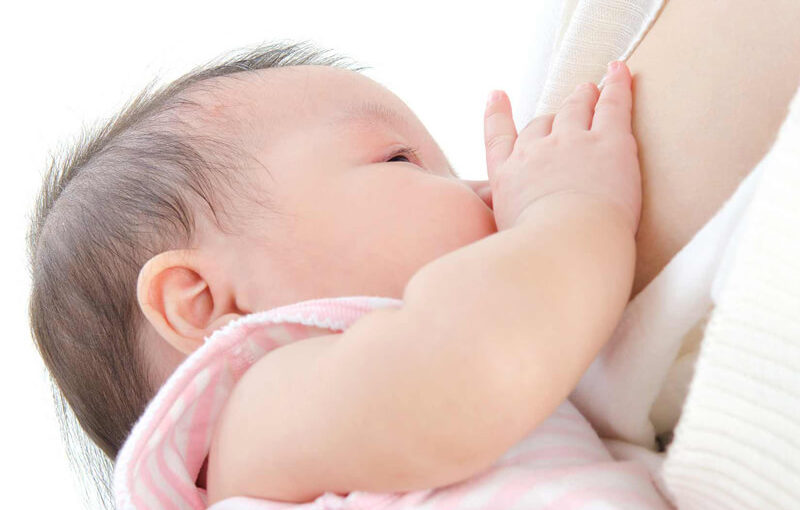
The recent UNICEF reports suggest that one out of every two infants are not given breast milk within the first hour of birth. It deprives them of quintessential disease-preventing nutrients and immunizers or antibodies. This makes them prone to disease or in severe cases, death.
–

–
Prevent Child Death Rate
France Bégin, UNICEF Senior Nutrition Adviser, opines that the mothers should not wait the babies wait too long for their first critical contact with their mother outside the womb. This reduces the newborn’s possibilities of survival along with limiting milk supply. It also diminishes the chances of exclusive breastfeeding. He also suggests that all the babies should be fed nothing but breastmilk from their birth till they are six months. It could prevent child death rate thereby saving atleast 800,000 lives every year.
–

–
Baby’s First Vaccine
Bégin adds that early breastfeeding can make the difference between life and death and that breastmilk is a baby’s first vaccine. Notwithstanding the known advantages of early breastfeeding, progress to promote it all over the world has been slow, particularly in sub-Saharan Africa, where death rates for children under age 5 are the highest.
Over the past 15 years, development has been much faster in South Asia, where rates of early breastfeeding have tripled. It has made an increase from 16 percent to 45 percent. However, it also leaves 21 million newborns to wait too long before being breastfed.
–

–
Breastfeeding Time
According to UNICEF, the risk pf death in the first month of life is high when the breastfeeding time is delayed. Lagging of breastfeeding by atleast 2 to 23 hours after childbirth raises the risk of dying in the first 28 days by atleast 40 percent.And, if it is postponed by 24 hours or more, it increases that risk to atleast 80 percent.
Babies are not being breastfed immediately even when there is a trained doctor or nurse of a midwife. However, in the Middle East, South Asia and North Africa, women who deliver with an experienced birth attendant are less likely to begin breastfeeding in the first hour of life when compared to women who deliver with amateur attendants or even relatives.
–

–
Breastmilk Helps
Breastmilk helps to keep your baby healthy in lot many ways. It provides all the essential nutrients in the correct proportions, protects against allergies, obesity and sickness.It also protects the babies against diseases, like cancer and diabetes. It defends the newborns against infections, like ear infections. The breast milk is easily digestible hence there is no case of diarrhoea, constipation or an upset stomach. It also provides the babies with healthier weights as they grow.
–

–
Breastfeeding For Mothers
Breastfeeding is not only important for the babies, but for the mothers too. Mothers who breastfeed have a decreased risk of Type 2 Diabetes and certain cancers such as breast cancer. It will be easier for the mother to get back to what they weighed before they got pregnant. It also plays a major role in strengthening the bond with their children.
–

–
Artificial Milk Formulas
The UNICEF says that in many countries, it is common to feed a baby with infant formula, cow’s milk or sugar water in the first few days. Sadly, when the babies are fed with these less nutritious alternatives over breastmilk, they tend to breastfeed less often. This makes it harder for mothers to begin and continue breastfeeding. By using artificial milk formulas in the place of breast milk, it can interfere with the maintenance and establishment of successful breastfeeding. On the other hand, it also has a risk of the baby becoming sensitive to cow’s milk protein or any other allergies.
–

–
There is a list of benefits that breastfeeding within the first hour brings both to the mother and the baby. Breastfeeding in the first hour helps the mother to get more confident that she can breastfeed. The first breastmilk, which helps in protecting the baby against infection and disease is called as Colostrum. The baby will receive the immunological effects of Colostrum when the newborn is fed in the first hour.
If the baby feeds at this stage, the sucking complications could be avoided.
–

–
If you have given birth to your baby by caesarean section or otherwise called as C-section, the first breastfeed may happen in the operating room, while you are being stitched up, with the baby passed under the sterile drapes. If at all this is not practicable, it will commonly occur in the post delivery room, as soon as possible after delivery, or as soon as you return back to your room. The feeding habits of your baby may be affected if you have had an epidural or general anaesthetic. The midwife should be with you during breastfeeding if you are on intravenous medications to reduce pain.
–

–
Any quantity of breastmilk lessens a child’s risk of death. Babies who receive no or less breastmilk are seven times more prone to death due to infections than those newborns who get at least some breastmilk in their first six months of life.